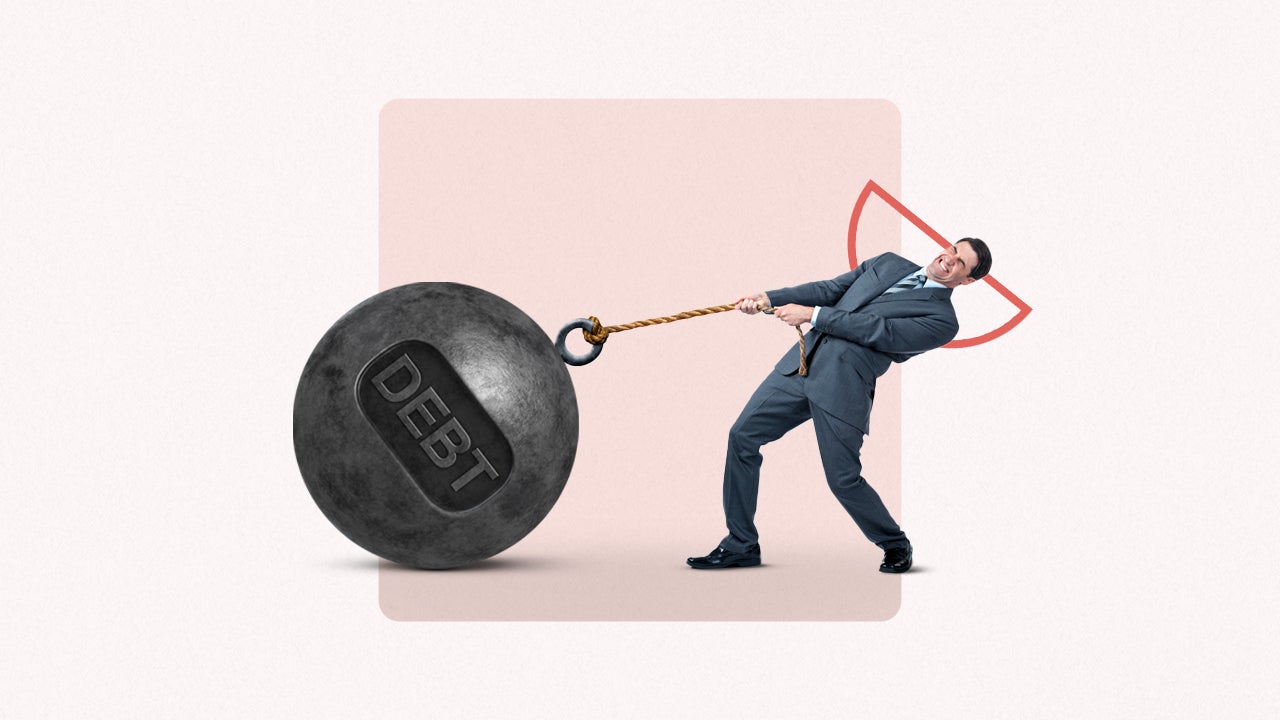Should you use a home equity loan to pay off your debts?

Key takeaways
- A home equity loan can be a good option to consolidate debt, as it usually carries lower interest rates and longer terms than other financing options.
- Advantages of using home equity loans or HELOCs to pay off debts include having fewer bills to pay and lower monthly payments (compared to credit card bills, especially).
- But tapping your home equity for debt consolidation means putting your home up as collateral and diluting your ownership stake, which can be notable downsides.
Getting out of debt isn’t easy, especially if it’s in the form of credit cards, whose high interest rates can make balances mount far beyond your actual expenditures. Small wonder that nearly half (46 percent) of credit cardholders carry debt from month to month, and of that group, the majority (53 percent) have been in credit card debt for at least a year, Bankrate’s Credit Card Debt Survey found.
If you’re a homeowner, however, you might be able to find relief by borrowing against your home’s value. The average interest rate on home equity loans — and HELOCs, their line-of-credit cousins — is currently less than 8.5 percent, far lower than the double-digit APRs on credit cards and personal loans. Even so, using a home equity loan to pay off your debts isn’t a no-brainer: It carries some unique risks. Here’s how it all works, along with the key pros and cons to consider before adopting this financial strategy.
Why use a home equity loan to pay off debt?
Because they have lower interest rates than other loans, using a home equity loan or a HELOC to pay off debt is a viable choice for people who own much of their property outright, free of mortgage debt.
The average interest rate on home equity loans is currently hovering around 8 percent, far lower than the double-digit APRs on credit cards and personal loans. As you can imagine, less interest means smaller monthly payments and lower overall borrowing costs.
According to Bankrate’s Credit Card Debt Survey, the number of cardholders who carry debt from month to month varies among generations, from 55% of Gen X cardholders to 44% of boomer cardholders, with millennials and Gen Z at 49% and 35%, respectively. However, older generations are more likely to have home equity reserves at their disposal, since they’ve probably paid off much, if not all, of their mortgages.
Pros of using home equity loans or HELOCs for debt consolidation
Using your home equity for debt consolidation can be a smart move for a number of reasons, including:
- You’ll have one streamlined payment.
- You may qualify for a much lower interest rate.
- Your monthly debt payments may be lower.
One streamlined payment
When you consolidate your debt by using your home equity, you can simplify your life. Rather than managing one credit card bill that’s due on the 15th, another on the 20th and a personal loan payment due on the 27th, you’ll have just one due date to remember each month. Since on-time payments are a critical component of your credit score, this can help eliminate the potential for missing a payment due to calendar confusion.
Lower (and locked-in) interest rate
Since your home is acting as collateral, a home equity loan generally comes with a lower interest rate than other, unsecured forms of debt that aren’t backed by anything. As of November 2025, the best home equity loan rates (for the most creditworthy borrowers) are under 7 percent, which can shave a sizable chunk off your bill compared with an average credit card rate of 20 percent.
Plus, a home equity loan carries a fixed rate, so your payment will always be the same. That’s a big difference from a credit card, which has a variable APR. (Note: Most home equity lines of credit also have fluctuating rates, though you can sometimes switch to a fixed-rate HELOC.)
Lower monthly payments
Using a home equity loan for debt consolidation will generally lower your monthly payments since you’ll likely have a lower interest rate and a longer loan term. If you have a tight monthly budget, the money you save each month could be exactly what you need to get out of debt. (But keep in mind that a long loan term translates to higher interest charges over the life of the loan — a trade-off you may be willing to make to get out of debt.)
Cons of using home equity to pay off debt
While a home equity loan for debt consolidation might work for some people, it’s not necessarily the best choice for everyone.
Among the drawbacks:
- Your home is at risk if you default on the debt.
- Your interest rate could still be high.
- You risk increasing your debt load if you resume old spending habits.
- You’ll pay upfront (and potentially ongoing) fees.
Risk of foreclosure
There’s a reason that home equity loan rates are lower than a lot of other borrowing routes: The lender gets to take your house if you don’t pay it back, which offers a pretty nice piece of reassurance. The potential for foreclosure should be top of mind if you’re thinking about applying for a home equity loan. Should you sell your home while the loan is outstanding, you’ll have to repay it all at once, the same way you’d have to settle your original mortgage.
Rates can still be high
Don’t confuse “cheaper” with “cheap.” Home equity products cost less than other loans, true, but a loan with a 7-to-10 percent interest rate is hardly free money.
And that’s especially true if you’re looking to settle outstanding bills. Don’t let an advertisement for “rates as low as” fool you — these tempting teaser percentages are reserved for sterling applicants, with sky-high credit scores and low debt levels. If you’ve maxed out your credit cards, owe a lot on student loans or have mounds of medical bills, you probably aren’t in the running for the best offer.
“If you’re carrying large credit card balances, that can signal to lenders that you are a high-risk borrower,” says Linda Bell, senior writer on Bankrate’s home lending team. “While you can still get a home equity loan if your credit card debt is substantial, lenders will compensate for that added risk by giving you a higher rate. If you fall into this group, it makes sense to wait until you get your debt levels down before applying.”
Increased debt load
While you can use a home equity loan to consolidate your debt, it’s only helpful if you change the spending habits that caused that debt to pile up in the first place. If you clear your card balances and then promptly start charging again, you’re making your debt worse — you’ll owe a home equity loan payment plus new credit card payments. It’s crucial to address the root cause of your debt before taking on another loan.
Borrowers need a healthy amount of home equity (owning at least 20 percent of the home outright, preferably closer to 40 or 50 percent) to qualify for these loans. Keep in mind that you’re depleting your ownership stake by tapping your equity. Your assets will have shrunk, and your obligations will have increased. That’s not going to improve your debt-to-income ratio or your loan-to-value ratio, two aspects of your financial profile that lenders often look at.
Out-of-pocket fees
When you borrow a home equity loan, you’ll likely be charged a series of upfront fees or charges to close on the loan. The lender imposes some of these expenses, while others are assessed by third-party service providers. The fees may include the following:
- Origination fee: Usually between 0.5 and 1 percent of the total loan amount
- Home appraisal fee: Anywhere from $314 to $423, according to 2025 data from Angi, the renovation site and search service
- Credit report fee: $10 to $100
- Legal fees: Flat hourly rate or percentage of loan amount
- Notary fee: $100 and up
- Title search fee: $100 to $450
These closing costs tend to be less than those for mortgages, but they do add up — sometimes to as much as 5 percent of the loan amount (and if you have a six-figure loan or credit line, that can be a few thousand dollars). Plus, many HELOCs carry annual maintenance fees. If you have a lot of debt to consolidate, paying these extra fees might still make sense, but it’s wise to budget for them and compare them to the amount you’d ultimately save in interest with the loan over the credit card bills.
What kind of debt should you consolidate using a home equity loan?
These are the types of debts that are well-suited for paying off with home equity loans.
Credit cards
Many homeowners use a home equity loan to settle outstanding credit card balances — behind home renovations, it’s the most common application. The reason is simple: home equity loan interest rates (currently averaging around 8 percent) are at least half as low as credit card rates (over 20 percent). That means you can pay your credit cards off with one lump sum, faster and more cheaply, than you would by just making the minimum credit card payment each month.
Personal loans
Personal loans vary a great deal, but odds are the interest rate on yours will be higher than that of a home equity loan, especially if it’s unsecured. The average personal loan rate in late 2025 was over 12 percent. Loans that aren’t backed by any collateral are usually pricier than secured ones, because the lender is assuming more risk. Home equity loans often offer much longer repayment terms — as much as 20 years — than personal loans do, too.
Medical bills
According to the Consumer Financial Protection Bureau, 15 million Americans have medical debt on their credit reports, with an average balance exceeding $3,100. You can use your home equity to cover such healthcare costs, if a substantial amount isn’t covered by health insurance. And if you opt for a HELOC, you can benefit from flexible repayment amounts (most allow for interest-only payments during their initial draw periods). Before you make any moves, however, talk to the healthcare provider about any low-cost payment plans they offer.
Student loans/educational expenses
If you need to pay off student loans, borrowing money from your home is one possible way to do it — provided the home equity loan offers a lower interest rate or other more favorable terms. However, you won’t get to take advantage of the student loan tax deduction, and if it’s a federal loan, you’ll lose other potential benefits, like forgiveness or income-based repayment options.
Whatever your type of debt, always be sure to compare several home equity lenders’ offerings. Shop around not only for the best interest rate/APR, but the smallest fees and closing costs.
What kind of debt should you not consolidate with home equity?
There are some instances in which a home equity loan may not be the best idea.
Auto loans
Cars depreciate rapidly, meaning they lose value over time. In a few years, your home equity loan balance could be more than the value of your vehicle. Plus, if you have good to excellent credit, current rates for purchasing a new car are well below average home equity loan rates.
Vacations or luxury items
Though tempting, it isn’t a good idea to use a home equity loan for a holiday or a big-ticket item. If you have to borrow money, it means that your income cannot sustain your spending, and this bad habit can sink you deeper into debt. Before you splurge, remember how long a loan will last — you’ll still be repaying it long after the good times are over.
Mortgages
Since mortgage rates generally run lower than home equity rates, it rarely makes sense to pay off your primary mortgage with a home equity loan or HELOC. In some cases, you might consider refinancing instead.
Investments
Investing is important, but taking on debt to do so is debatable — especially given the current high cost of borrowing, which rivals stock market returns. Avoid using a home equity loan for investments. It’s better to use savings or earned income, especially if you can invest via a company 401(k) plan.
You could potentially lower your interest rate. But there’s the possibility of losing your home if you can’t pay the loan back.— Linda Bell, senior writer, Bankrate
Is a home equity loan or a HELOC better for settling debts?
Both HELOCs and home equity loans can be good ways to settle debts. However, in the case of credit card debt, a home equity loan may have a slight edge.
Presumably, you can calculate the sum of your credit card balances. And paying them off quickly should be a high priority — their high APRs make those balances multiply every month. This situation — a precise sum you want to settle ASAP — is tailor-made for a home equity loan, which disburses a single lump payment. Yes, you’ll have to begin repaying the loan, both principal and interest, right away, but it’s bound to be lower than what you’re shelling out on all the cards.
In contrast, HELOCs work well when you’re not sure of the exact amount of money you’ll need, or for expenses that get incurred over a long period. But in this case, there’s no advantage to drawing funds out gradually, especially when you consider that many HELOCs carry annual fees.
Other ways to consolidate debt
Home equity loans aren’t your only option for debt consolidation. Before you put your home up as collateral, be sure to compare the alternatives.
- Balance transfer credit cards: If the majority of your debt is through credit cards, you can consider transferring your balances to a new credit card that comes with an extended introductory period offering a 0 percent APR — meaning you won’t incur any interest charges on the amount during the promotional period (often between 12 and 21 months). However, some card issuers may limit how much you can transfer — often up to $10,000. The new card’s interest rate will kick in after the promotional period ends, and you’ll be back in the same fix unless you’ve settled the balance before then.
- Cash-out refinance: Rather than taking out a second mortgage via a home equity loan, you can replace your original mortgage altogether — and borrow even more — with a cash-out refinance. The additional cash you can borrow is based on the home equity you have built up. This move makes the most sense if you can score a lower rate with the new loan.
- Debt consolidation loans: There are loans specifically designed to combine and pay off debts. Some of the best lenders offer rates that can rival home equity rates if your credit is excellent. However, the terms tend to be much shorter. While home equity loans may offer 20-year repayment terms, debt consolidation loans tend to work on tighter timelines — often seven years or less — and the lowest rates often require a repayment term of three years or shorter.
Bottom line
Using home equity for debt consolidation “can be a smart move for borrowers with a large amount of high-interest credit card debt because the [HE] loans usually have lower rates than credit cards,” Bell says. “That can save you some big money in the long run by reducing your monthly payments and the amount of interest you pay over time.”
While that can make a positive impact on a borrower’s bottom line, it won’t solve the problem, she points out. “Remember that you are simply shifting one form of debt for another,” Bell says. You’re still going to have to pay off all the money you owe; it’ll just cost you less to do so.
So proceed with caution before committing to home equity financing. “Sure, you could potentially lower your interest rate,” Bell says, “but there’s the possibility of losing your home if you can’t pay the loan back.”
Frequently asked questions
Why we ask for feedback Your feedback helps us improve our content and services. It takes less than a minute to complete.
Your responses are anonymous and will only be used for improving our website.
You may also like

How debt consolidation loans work

Reasons not to tap your home equity




